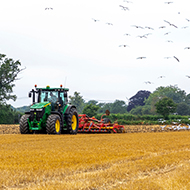£25m in grants made available to farmers to boost productivity

The grants form the third and final round of the Government's Countryside Productivity Small Grants scheme.
Farmers across the United Kingdom can now apply for grants to help boost their efficiency and improve the environment.
Farming minister Victoria Prentis said the third and final round of the Government's Countryside Productivity Small Grants (CPSG) scheme will see £25 million being made available to farming businesses.
Under the scheme, farmers will be able to apply for grants of between £3,000 and £12,000 to buy new and innovative equipment, from livestock monitoring cameras to precision farming technology. The initiative aims to help businesses save time and money and boost productivity.
“Coming from a farming family, I have experienced first-hand the benefits that having innovative equipment can bring, including saving businesses time and money while improving yields and minimising the impact we have on the environment around us,” said Ms Prentis. “Our landmark Agriculture Bill sets out further measures to help farmers become more productive, efficient and resilient, with specific productivity grants expected to be available from 2021.”
During the first two funding rounds of the CPSG scheme, some £35 million was allocated to farmers. This latest announcement brings the total funding made available under the scheme to £60 million.
Farmers that successfully applied to grants in previous rounds of the scheme will be able to apply for different items of equipment in the final round, up to the limit of £12,000 per farmer.
“It’s fantastic to be able to announce a third round of the ever-popular Small Grants scheme,” commented Rural Payments Agency chief executive Paul Caldwell. “Having access to game-changing innovative technology can make a real difference to farmers and help boost the productivity of the whole farming sector in England.”



 The Federation of Independent Veterinary Practices (FIVP) has announced a third season of its podcast, Practice Matters.
The Federation of Independent Veterinary Practices (FIVP) has announced a third season of its podcast, Practice Matters.